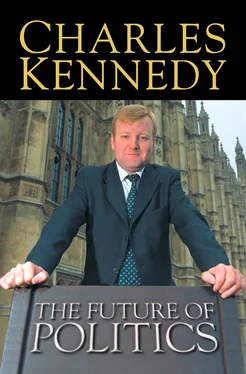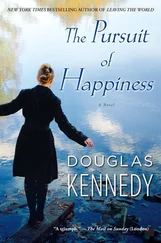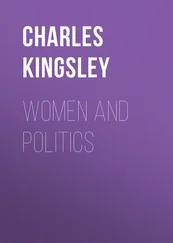The low level of enthusiasm for voting is a reflection of the critically low interest in political matters as a whole. Half of eighteen to twenty-four-year-olds surveyed by MORI in 1999 reported that they were not interested in politics. Over 80 per cent claimed to know little or nothing about Parliament, and 30 per cent said they had never heard of proportional representation! As someone who has visited many schools and colleges across the country, I can say without reservation that today’s young people are just as energetic and curious as my own generation, if not more so, but the truth is that their interests are focused increasingly away from politics and onto other things. We politicians have clearly played a part in that process.
As someone who has attended nearly every Brit Award ceremony since entering Westminster, I find it telling that politicians are hardly ever invited any more to present one of the awards. It used to be a common occurrence, but they simply do not have that sort of status among the young nowadays. If MPs stand too close to a pop star, they are more likely to get a bucket of water thrown over them, as happened to John Prescott a couple of years back. I felt a great deal of sympathy for John on that occasion, but I thought the episode was a telling symbol of popular disenchantment.
Given that young people nowadays are less likely than before to be interested in politics, to be knowledgeable about the political system, or to have formed an attachment to a particular party, what does this say about their attitudes towards the whole democratic process? Surely their low levels of political interest and knowledge translate into mistrust, cynicism and apathy?
The figures support this contention. A MORI survey of sixteen to twenty-four-year-olds ranked politicians and journalists bottom on the list of people they could trust. The same survey asked youngsters whether they thought various schemes (such as polling booths in shopping centres and Internet voting) might encourage them to vote. The answer was an overwhelming no. Such is the level of disillusionment among the young – they are not abstaining because voting is inconvenient. They are abstaining because they quite plainly cannot see the point.
This attitude translates into a wider sense of alienation from nation and community as a whole. Over one third of those polled said they did not feel strongly attached to their community; a fifth said they felt the same about their country; and two thirds reported feeling little or no attachment to Europe. Over a third said they knew little or nothing about their responsibilities as a citizen. Politicians should be frightened by what these figures are saying: there is a whole stratum of young people who don’t vote, know nothing about politics and don’t feel that they belong anywhere.
Disillusionment is not solely a feature of adolescence, at least not in terms of politics. Youths who can’t see the point in voting grow into non-voting adults. As a result, Britain’s turnout record leaves a lot to be desired. The public seems to have least interest in European elections. For example, in 1979, 1984 and 1989, around one third of the electorate voted. In 1999 it was even worse – less than a quarter, making Britons the most reluctant voters in the EU.
Analysts have not undertaken any serious study of non-voting in European elections. It is generally assumed that the remoteness of the European Parliament and antipathy towards the EC/EU accounts for the low levels of participation. The unwieldy size of European constituencies also makes it very difficult for the parties – who are used to campaigning in Westminster constituencies – to work effectively on the ground in order to get voters out of their front doors and down to the polling booths.
Far more worrying is the body of statistics which shows that there is similar public apathy when it comes to electing our own governments. Turnout for the 1997 general election was 71.4 per cent, the lowest figure since 1945. Despite the unpopularity of John Major’s government, over one quarter of voters stayed at home. We are not the most apathetic country in Europe, but our turnout figures compare unfavourably with those of Spain, Sweden, Greece and Italy. If we add New Zealand, Australia and the USA to the equation, then Britain has the fourteenth poorest voting figures out of twenty nations.
This is a nationwide problem. The electoral roll doesn’t help, as there is a time lag in setting up the electoral register, which makes voting difficult for people who move around. The situation was also exacerbated by the hugely unpopular Poll Tax in the eighties, as large numbers of people took themselves off the electoral register in order to avoid paying the tax, but this predates the Poll Tax: the trend of turnouts in general elections has been downwards since a post-war high of 84 per cent in 1950.
Some elements of British society seem to be more disengaged than others. We have already seen that the young vote in disproportionately small numbers. There is also a huge variation in turnout figures when we compare different constituencies, which often ties in with levels of social deprivation, particularly with levels of unemployment. In 1997, turnout ranged from 81.1 per cent (Wirral South) to 51.6 per cent (Liverpool Riverside). In May 1997, the unemployment rate in Wirral South was 5.1 per cent, while Liverpool Riverside had a rate of 19 per cent unemployment, the third worst figure in England. In short, the poorest sections of society, those with, arguably, the most pressing reasons to make their voices heard and bring about change, are the most disillusioned with the political process and the least likely to vote.
Some of these concerns are far from new. I recently came across a fascinating book on the Chicago Mayoral election of 1923. Then, out of an electorate of 1.4 million, only 723,000 voted – a turnout of slightly under 52 per cent. Non-Voting: Causes and Methods of Control, 4 Конец ознакомительного фрагмента. Текст предоставлен ООО «ЛитРес». Прочитайте эту книгу целиком, купив полную легальную версию на ЛитРес. Безопасно оплатить книгу можно банковской картой Visa, MasterCard, Maestro, со счета мобильного телефона, с платежного терминала, в салоне МТС или Связной, через PayPal, WebMoney, Яндекс.Деньги, QIWI Кошелек, бонусными картами или другим удобным Вам способом.
looks at some familiar problems, including the public views that ‘voting changes little’ and that ‘politicians can’t be trusted’. In the twenties, though, much of the blame for poor turnout seemed to be blamed on the cowardice, laziness, ignorance or stupidity of voters.
Today, we are far more likely to look at the failings of politicians rather than voters. This is, in my view, entirely correct. We created the disillusionment, and we have to find a way to solve it. I don’t pretend it is an easy job. As the book on the Chicago 1923 election said, ‘The disillusioned voter, who believes that one vote counts for nothing, presents a difficult problem of political control. The ignorant citizen can be informed, the indifferent citizen can be stirred out of his lethargy, but the sophisticated cynic of democracy cannot be moved so easily.’
So, where do we start? Is it enough to target the young and the poor, or do we need a broader, nationwide approach to restore people’s faith in the political process? One thing is certain – until we have won people’s trust back there is no way we can claim to live in a democracy. Democracy isn’t just about everyone having the potential to change the way society works. Democracy is about a state where precisely that happens, because people are confident that their opinions matter and that they can make a difference. In a country where over a quarter of citizens don’t exercise their right to choose the new government, and where the poorest have the least inclination to improve their lot, there can be little progress, only marginal improvement.
Читать дальше












